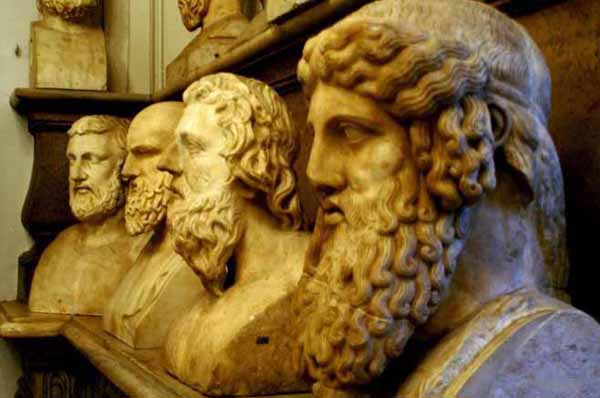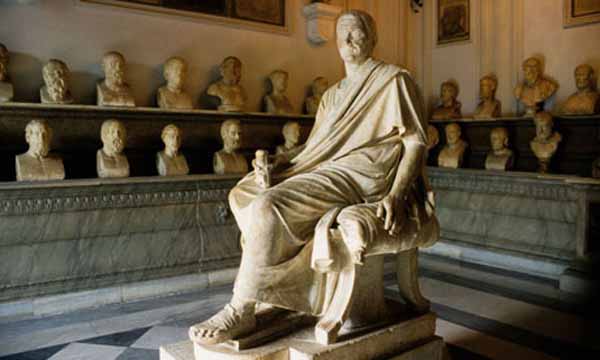
Hall of Philosophers


Hall of Philosophers

A final level of education was philosophical study. The study of philosophy is distinctly Greek, but was undertaken by many Roman students. To study philosophy, a student would have to go to a center of philosophy where philosophers taught, usually abroad in Greece. An understanding of a philosophical school of thought could have done much to add to Cicero's vaunted knowledge of 'that which is great', but could only be pursued by the very wealthiest of Rome's elite. Romans regarded philosophical education as distinctly Greek, and instead focused their efforts on building schools of law and rhetoric.
The single most important philosophy in Rome was Stoicism, which originated in Hellenistic Greece. The contents of the philosophy were particularly amenable to the Roman world view, especially since the Stoic insistence on acceptance of all situations, including adverse ones, seemed to reproduce what the Romans considered their crowning achievement: virtus, or "manliness," or "toughness." The centerpiece of Stoic philosophy was the concept of the logos. The universe is ordered by God and this order is the logos , which means "rational order" or "meaning" of the universe.
After the death of Zeno of Citium, the Stoic school was headed by Cleanthes and Chrysippus, and its teachings were carried to Rome in 155 by Diogenes of Babylon. There its tenets were made popu lar by Panaetius, friend of the great general Scipio Aemilianus, and by Posidonius, who was a friend of Pompey (see your textbook if you don't recognize these names); Cicero drew heavily on the works of both.
Stoic ideas appear in the greatest work of Roman literature, Vergil's Aeneid , and later the philosophy was adopted by Seneca (c. 1-65 A.D.), Lucan (39-65; poet and associate of the Emperor Nero), Epictetus (c. 55-135; see passages from the
This is actually not a philosophical school, but one could generally group a number of Hellenistic schools under this rubric, including the Second Academy (Hellenistic Platonists), the Second Sophistic, the Cynics, the Skeptics, and so on, and, for the most part, the Stoics as well. What is important for our purposes is that all these schools to some degree or another espoused the idea that human beings cannot arrive at certain truth about anything (not all denied certainty was impossible, only that human beings could never be certain).
Basically, life became this great guessing game: the lot of humanity is to be cast into a twilight world in which all that we know and think is either false or occupies some middle position between the false and the true (which was called the "probable," or "readily believable,"). This comes to dominate thought in late antiquity; the first philosophical attacks Christianity levels against the thought of antiquity are refutations of skeptical principles. Of all the philosophies of antiquity, this is perhaps the most familiar to you: the skeptic principle of doubting everything became, in the modern era, the fundamental basis of the scientific method.
Logos is a linguistic term; it refers particularly to the meanings of words. The meaning of an individual word all by itself is semeion ; the meaning of an individual word in the context of a sentence is logos . For the Stoic, the meaning (logos ) of each individual life, action, and situation is determined by its place in a larger whole, which is, of course, the whole course of history. In this view, history becomes a kind of speech by God.
It is progressive, it is teleological, it is meaningful (but only when it's all done: a sentence has no meaning until it's completed). Each and every event, physical and historical, has a place within this larger rational order or meaning. Since the order is rational and meaningful, that means nothing happens which is not part of some larger reason or good (Christianity will adopt this idea wholesale; check out Boethius' Christianization of this concept).
For the Roman, this larger good came to mean the spread of law across the face of the planet; this law was to be spread through Roman imperial conquest and was called the Law of Nations. The grand design for history, then, was the spread of the Roman Empire and her laws.
Therefore, each and every function a Roman undertook for the state, whether as a farmer or foot-soldier, a philosopher or emperor, partook of this larger purpose or meaning of world history. The central values of this complex are officium, or "duty," which is the responsibility to perform the functions into which you have been born to the best of your abilities, and pietas, or "respect for authority." Each station in life has its duties; every situation in life has duties or obligations incumbent on it.
The primary duty one owes is to the state; since God is using the Roman state to further law and civilization, performing one's duty is a religious act. The principal being to which one owes respect is, of course, God; since God is working out his will in history by using the Roman state and Roman officials (derived from officium ), the respect one shows for Roman authorities is also a respect shown for God and the logos.
ANCIENT AND LOST CIVILIZATIONS